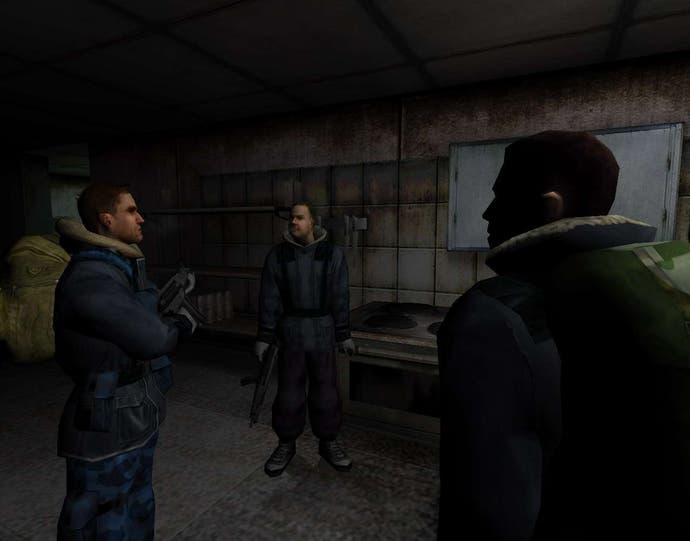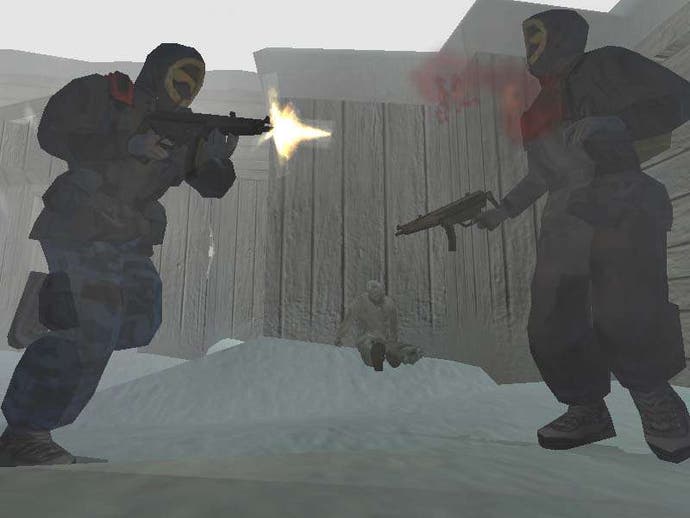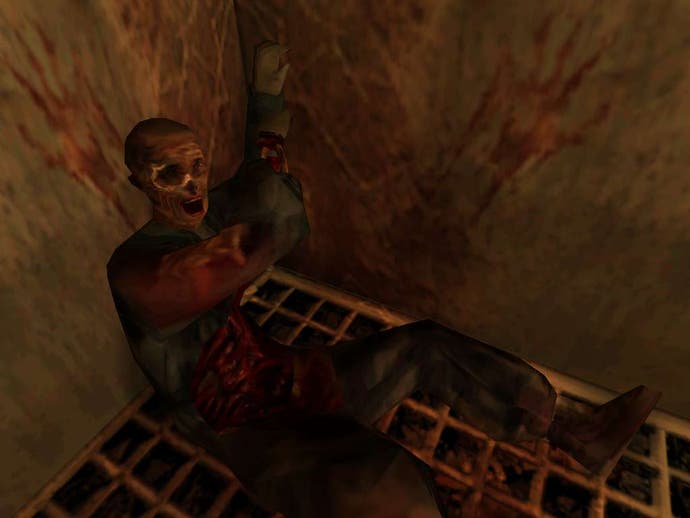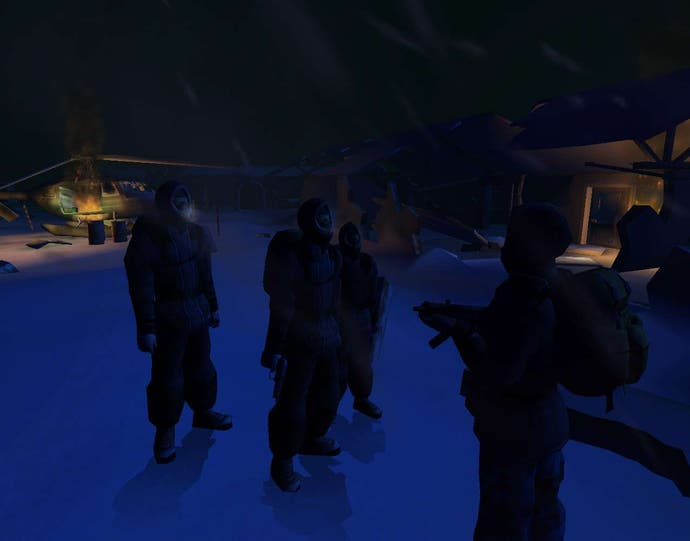Chris Hadley of Computer Artworks
Interview - we talk to The Thing's producer about the role of fear and trust in this novel horror game
John Carpenter's 1982 remake of The Thing From Another World has become a classic of the sci-fi horror genre, with its gruesome special effects and claustrophobic atmosphere adding up to a terrifying experience. Now, with the 20th anniversary of The Thing's cinematic release upon us, Computer Artworks and Vivendi Universal are hoping to replicate that success in videogame format. We caught up with senior producer Chris Hadley at a recent press event in London to find out more...

Now I'm Going To Show You What I Already Know
At first sight The Thing looks like a straightforward action-adventure game, but as Chris explained to us, "it's not until you start playing it and start getting into the actual mechanics that you realise it's nothing like anything before, it is totally different".
Perhaps that's slightly over-stating the case, but certainly The Thing has some unusual tricks up its sleeves. The most important of these is the way in which the AI characters react to you, the Things, and their surroundings. During the course of the game you'll be joined by a cast of around thirty unique characters, up to four of whom will accompany you at any one time. And just like in the movie, you'll never be entirely sure who is human.
"The biggest random part about it is your NPCs, who can get infected by being in combat with Thing beasts. They won't always burst out, they'll try to stay hidden, same as in the film - most of the time [a Thing] wouldn't show itself unless it was left alone with one guy, or if there was another Thing beast in the room. We had to come up with a rule set of what was driving and motivating the Thing beasts and we decided, based on the film, that the best thing to do was not to have these Things burst out straightaway. They don't really want to show themselves: their primary goal is to stay hidden and infect more people. So you can be walking around with two or three guys who are infected and not know it."

Nobody Trusts Anybody Anymore
This raises some interesting questions. Do you give one of your men a weapon to defend himself with, or could he be a Thing just waiting to burst out and attack you? You have to work with other characters to make it through the game, but can you really trust them? And do they trust you? Unusually, your behaviour in the game actually effects how your squad reacts to you and whether they will follow your orders.
For example, because the Thing likes to take control of people one at a time, picking them off in isolation, if you leave someone alone for a long time they'll start to lose confidence in you. "We had to tweak that for a bit", Chris admitted. "To start off we had it so that if you went away for thirty seconds or a minute they'd get a really big trust loss. The problem is that quite a lot of the time you need to go away and do things, so what we've now done is that you'd have to leave that person alone for quite a long time before they lose trust in you."
There are quicker ways to annoy your men though, as Chris demonstrated on a hapless marine. "If I shoot him, he now sees me as an enemy. He's dropped his weapon because he doesn't have any ammo, and he came after me to try to get my gun. But he gives up after a short amount of time, because we didn't want it to turn into Benny Hill. Which it was when we first put it in - basically you'd just end up following and chasing each other all over the place. Now, if there's two or three guys around them, they can push one of the other guys over and take his weapon and start shooting you as well. So even if he decides not to try and chase you, he can still take a gun off somebody else."
When they're not trying to kill you, your squad can help you take care of the Thing beasts that swarm over many of the levels. "The NPCs can use the flamethrowers, but they're not particularly careful with them, they tend to be over the top. So if you're in a tight situation where there's a lot of fuel barrels around, you probably don't want to give them flamethrowers. [But apart from that] the NPCs are actually pretty good at combat, and the problem was that the player could leave them to take care of everything. So what happens now is that if you leave them to take care of combat too much, they'll start distrusting you and not take orders from you."

Emotional Response
It's not just trust that you have to worry about, either; your men also have a fear rating, which is determined by the environment and how much danger they're in. "As you get more enemies and lots of gore in an area, they get scared. If they come across a room where there's a big body or lots of blood or something like that and they're in high fear, they'll do things like throw up or get down on their knees and pray."
"There isn't any other game out there where you can have squad members that have different emotions, and those emotions dictate whether they work with you or against you. You don't normally have a situation where your guys can turn on you and kill you, or refuse to take an order, or start vomiting in the corner. Normally if you've got a squad, those guys follow you without questioning anything that you do; they're your wingmen, they'll shoot anything, but that's about it. [In The Thing] they've actually got some intelligence, but it's more the emotions than anything else. These guys are about as alive as you can make with the technology we have at the moment."
"This is all quite amusing and it's good to watch, but it also has a real impact on the way the player interacts with the game. You can't finish this game on your own, you have to use the NPCs, they've got abilities which you don't have. Some of them are expendable, but it will make it more difficult because you've got more Things to kill and less people to help you out. In other areas you have to have them, and as soon as you kill them or they die it's game over. So it's not just yourself that you have to look out for, you've got to watch out for four other guys as well, because if any of those die that could end your level as well."

Mind Games
All of this might sound a bit overwhelming, but the game eases you in quite gently at first, and the actual interface for controlling your squad is fairly straightforward. The mechanics of the fear and trust systems also give players a lot of freedom in how they approach the game. For example, if your men stop trusting you and refuse to obey your orders, you can always force them to help.
"If [an NPC] was in amber state and you aimed your gun at his head, after a set amount of time he'll say 'alright, just don't shoot me', and you can actually coerce them to do something for you. They'll only do it for a short amount of time and then you get a massive trust loss, but it does let you get out of situations where you've not handled your team too well and you just need them to fix that one junction box."
"It comes down to the confidence of using the guys. To start off with, you're not all that sure about what you're doing with the team, but after you build up confidence in the first couple of levels it becomes fun doing things. Once you've got to the point where you've saved the game, you can then go back and start messing around with the guys and having fun with them. As soon as you start cottoning on to the fact that you can do different things to them, you can make them throw up and piss themselves and stuff, then it starts getting a bit fun and you can start monkeying around with them."
So much for the humans, what about the Thing beasts you'll be fighting against? Come back tomorrow and all will be revealed, along with more details on the game's development, the music and voice acting, and what it's been like designing versions of the game for three different platforms simultaneously.







